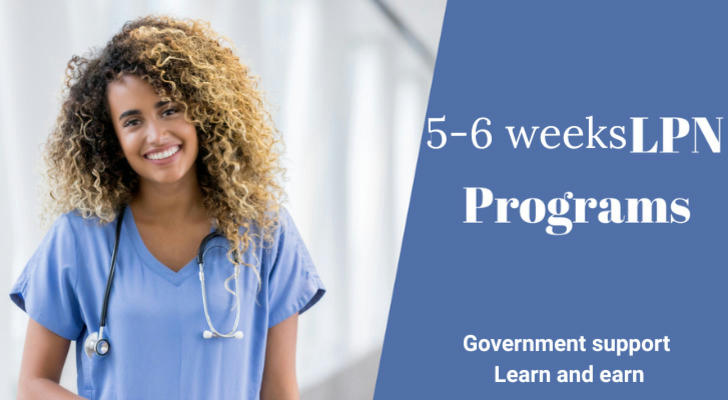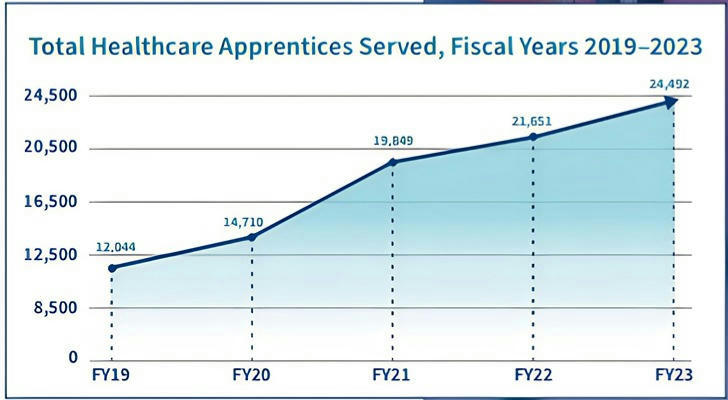Government Support Makes LPN Certification More Accessible!
The U.S. is currently facing a major shortage of Licensed Practical Nurses (LPNs). This shortage is putting pressure on hospitals and clinics and making it harder for patients to get the care they need. To help meet the growing demand, the government is stepping in with programs that offer financial help and affordable training options for those who want to start a career in nursing.

💡 Why Choose a Career as an LPN?
1. High Demand and Job Stability
The demand for LPNs is rising rapidly due to the aging population and increased healthcare needs. By 2030, the demand is expected to grow by 9%, leading to more job opportunities for those entering this field. Becoming an LPN offers long-term job security and a clear path for career advancement.
2. Fast-Track Training with Hands-On Experience
Most LPN programs are designed to get you trained quickly—some can be completed in as little as 5-6 weeks. These programs combine classroom learning with hands-on training in real healthcare settings. Some programs even allow you to get paid during your training, meaning you can earn an income while learning new skills.
3. Financial Aid from the Government
Eligible participants can benefit from government-backed financial aid, significantly reducing or covering the cost of tuition, textbooks, and certification fees. Many programs also provide job placement assistance, connecting graduates with healthcare facilities that are actively hiring LPNs.
🔥 Key Benefits of the Program
• Government-Backed Training: Much of the cost of training and certification is covered, making it easier to afford.
• Earn While You Learn: Some programs offer paid training,let you earn income while you’re training.
• Fast Track to Employment: The healthcare industry has a high demand for LPNs, meaning graduates can start working shortly after completing the program.
• Job Placement Assistance: Many programs partner with hospitals, nursing homes, and clinics to help graduates secure employment.
• Nationally Recognized Certification: After completing the course, you'll receive your official LPN certification, which is accepted across the U.S.
🔎 How to Enroll
Getting into one of these government-supported training programs is straightforward. Start by visiting the official website, filling out the application, and sharing your background and education history. If you're eligible, you'll receive the next steps to begin your training journey.
📌 Frequently Asked Questions
1. Who can apply?
Anyone who is a U.S. citizen or permanent resident, 18 or older, and has a high school diploma or GED can apply. You don’t need any healthcare background.
2. Is financial aid available?
Yes, financial aid is available for eligible students. It can cover your tuition, course materials, and exam fees.
3. How long is the training?
Most LPN courses take just a few weeks to finish and include a mix of book learning and practical experience.
4. Will I get certified?
Yes! Once you finish the program, you'll receive an LPN certificate so you can start working as a nurse.
5. Does the program offer job placement assistance?
Yes, many programs collaborate with healthcare facilities to help graduates secure employment after completing their training.

💬 True Story: From Retail to Healthcare
Take Jennifer. She worked in retail and had no healthcare experience. After joining a government-support licensed practical nurse (LPN) program, she completed her training in just five weeks. Her first job was at a nursing home, making $51,000 a year. Less than a year later, she moved to a hospital and now makes over $58,000 a year. Her story is a testament to how effective these programs are in changing lives.
✅ Career Opportunities for LPNs
Licensed Practical Nurses play a crucial role in the healthcare industry, providing essential patient care in hospitals, nursing homes, and clinics. LPNs are in high demand, with ample job opportunities available upon completing the program. With experience, LPNs can advance to supervisory roles or continue their education to become Registered Nurses (RNs), further increasing their earning potential and career growth opportunities.
Conclusion 🌟
There are real benefits to choosing a career as a Licensed Practical Nurse (LPN): job stability, good pay, and plenty of room for advancement. And thanks to government-backed training and funding, it’s now more affordable and less stressful to enter the profession. Some programs even offer a salary during training! If you’re looking for a stable, rewarding healthcare job, now may be the best time to make the move. Don’t hesitate to take the first step toward becoming a Licensed Practical Nurse!
